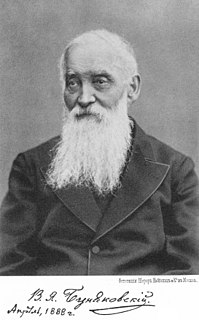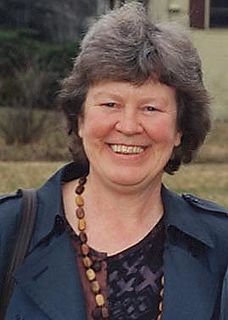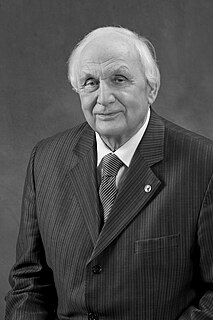
Israel Moiseevich Gelfand, also written Israïl Moyseyovich Gel'fand, or Izrail M. Gelfand was a prominent Soviet mathematician. He made significant contributions to many branches of mathematics, including group theory, representation theory and functional analysis. The recipient of many awards, including the Order of Lenin and the Wolf Prize, he was a Fellow of the Royal Society and professor at Moscow State University and, after immigrating to the United States shortly before his 76th birthday, at Rutgers University.

Eugene Borisovich Dynkin was a Soviet and American mathematician. He has made contributions to the fields of probability and algebra, especially semisimple Lie groups, Lie algebras, and Markov processes. The Dynkin diagram, the Dynkin system, and Dynkin's lemma are named after him.
Mark Aronovich Naimark was a Soviet mathematician who made important contributions to functional analysis and mathematical physics.

The Russian State University for the Humanities, is a university in Moscow, Russia with over 14,000 students. It was created in 1991 as the result of the merger of the Moscow Public University and the Moscow State Institute for History and Archives. The institute occupies a network of historic buildings along the Nikolskaya Street in Kitay-gorod, including the former Moscow Print Yard and the cells of the Zaikonospassky monastery.

Viktor Yakovlevich Bunyakovsky was a Russian mathematician, member and later vice president of the Petersburg Academy of Sciences.

Barbara Hall Partee is a Distinguished University Professor Emerita of Linguistics and Philosophy at the University of Massachusetts Amherst. She is one of the founders of contemporary formal semantics in the United States, the author of a number of influential works. She retired from UMass in September 2004.

Joseph Bernstein is a Soviet-born Israeli mathematician working at Tel Aviv University. He works in algebraic geometry, representation theory, and number theory.

Victor Anatolyevich Vassiliev or Vasilyev, is a Soviet and Russian mathematician. He is best known for his discovery of the Vassiliev invariants in knot theory, which subsume many previously discovered polynomial knot invariants such as the Jones polynomial. He also works on singularity theory, topology, computational complexity theory, integral geometry, symplectic geometry, partial differential equations, complex analysis, combinatorics, and Picard–Lefschetz theory.
Vladimir Markovich Entov was an applied mathematician and physicist.

Victor Andreyevich Kanke is a Russian philosopher born in the village of Nekrasovo, Slavgorod District, Altai Territory to a German family. He taught physics at school (1966-1974) and philosophy at the Biysk State Teacher Training Institute (1976-1987) and the Obninsk Institute for Nuclear Power Engineering.
Vladimir Andreyevich Uspensky was a Russian mathematician, linguist, writer, doctor of physics and mathematics (1964). He was the author of numerous papers on mathematical logic and linguistics. In addition, he also penned a number of memoir essays. Uspensky initiated a reform of linguistic education in Russia.

Vasyl Stefanyk Precarpathian National University is one of the oldest institutions of higher education in Western Ukraine. Its history dates back to March 15, 1940, when Stanislav Teacher Training Institute was established. Later, in 1950, it was renamed Stanislav Pedagogical Institute. In January 1971, the institution was renamed after a famous Ukrainian writer Vasyl Stefanyk by the decree of the Council of Ministers of the USSR.

Alexey Petrovich Stakhov born – Ukrainian mathematician, inventor and engineer, who has made contributions to the theory of Fibonacci numbers and the "Golden Section" and their applications in computer science and measurement theory and technology. Doctor of Computer Science (1972), Professor (1974). Author of over 500 publications, 14 books and 65 international patents.
Sergey Danilochkin – is the doctor of economical sciences, writer, engineer till entities of carriages (logistics), engineer – economist, correspondent member of the Russian Academy of Natural Sciences.

Mikhail Kharit – a Soviet and Russian scientist, architect, PhD in Engineering Science, professor, writer, Lenin Komsomol Prize laureate in science and technology.

Vladimir Voevodin is a computer scientist, professor at Lomonosov Moscow State University, the Faculty of Computational Mathematics and Cybernetics, Deputy Director of MSU Research Computing Center, corresponding member of the Russian Academy of Sciences, Professor, Dr.Sc..

Alexei Dzhermenovich Gvishiani is a well-known Russian scientist, full member (academician) of the Russian Academy of Sciences (RAS). Director of the Geophysical Center of RAS. Member of the Scientific Coordinating Council of the Federal Agency of Scientific organizations of Russia (FASO) and the Expert Council of the Russian Scientific Foundation. Foreign member of the Romanian Academy of Engineering and Technical Sciences and the National Academy of Sciences of Ukraine. Doctor Honoris Causa of the National Technological University of Ukraine, Professor of Lomonosov Moscow State University and the Paris Institute of Earth Physics of the Earth. Chair of the Russian Geophysical Committee and CODATA Committee of the Russian Academy of Sciences, Vice-President of CODATA in 2002-2006. Vice-Chair of the WDC Panel of the International Council for Science (ICSU) (1996—2006). Deputy Chairman of the Committee of System Analysis, RAS. Vice-president of the Scientific Council International Institute for Applied Systems Analysis (IIASA) and IIASA Program Committee Chair (2010—2014). Member of Academia Europaea (2017).

Vladimir Ilyin (1928—2014) was a Russian mathematician, Professor at Moscow State University, Doctor of Science, Academician of the Russian Academy of Sciences who made significant contributions to the theory of differential equations, the spectral theory of differential operators, and mathematical modeling.

Andrej Kibrik is a Russian linguist, the director of the Institute of Linguistics of the Russian Academy of Sciences, and professor at the Philological Faculty of the Moscow State University. Member of the Academia Europaea since 2013.

Dmitrij Kostomarov (1929—2014) is a Russian mathematician, Academician of the Russian Academy of Sciences, Dean of the Faculty of Computational Mathematics and Cybernetics at Moscow State University (1990—1999), Professor, Dr.Sc.





















